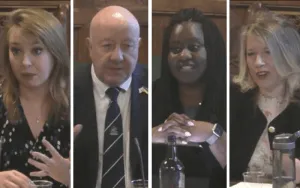Two gold medal-winning Paralympians have told MPs of the need to improve access to grassroots sports facilities for disabled people.
Lauren Rowles, a double Paralympic gold medallist in rowing, and Ellie Robinson, a Paralympic gold medallist in swimming, were giving evidence on Tuesday to members of the Commons digital, culture, media and sport committee.
The committee was hearing evidence as part of its inquiry into the future of the National Lottery, and it also heard in the same session from triple Olympic swimming gold medallist Adam Peaty.
Rowles told the MPs that access to most rowing clubs was “horrendous”.
She said: “How are we going to excel if we can’t even get into the building?
“Even for our biggest race, the Boat Race, Oxford-Cambridge… they get their wellies on and they walk out into the water.
“You wouldn’t see myself doing that as a wheelchair-user.”
Rowles added: “I wouldn’t be able to turn up at most clubs in London, and I’m at the top of my sport.
“One, they don’t have the access, and two, they don’t have the equipment that I would require.”
She said that disabled people were “shoved right to the back of the list” and the only way accessibility at grassroots level would improve would be through her and her team-mates “shouting about it”.
She said: “There are not enough disabled people in the sport at the moment, we have not got the next generation below us, so we are worried about funding for our team.
“It’s because most people can’t get access to a rowing club, so we have got to shout about it as athletes and go around talking about it to get anything done.”
Rowles said she was working with her sport’s national governing body to improve the accessibility of rowing clubs, and to encourage more disabled people into the sport.
Robinson, who retired from competitive swimming after this summer’s Tokyo Paralympics, agreed with the concerns about accessibility.
She told the committee: “We really need to make the grassroots more accessible.”
And she stressed that there was a need to make sport accessible for people of all incomes.
But she also called for funding for elite swimmers to be focused more on those who had realistic medal potential.
She said: “I think we need to focus on having a bigger pool of swimmers to choose from, choosing only the ones that have the potential to do it, and then investing your money in them because they are going to get results.
“I think we need to focus more on competence rather than just, ‘let’s get as many disabled people [as we can] into elite sport.’”
She said Paralympic sport had changed and was now “elite sport”, adding: “This is no longer medals for participation.”
Peaty called for more government investment in swimming.
He said: “I know if you’ve got a healthier nation, a fitter nation, a happier nation, and a valued nation, saying we are giving you the facilities, and we’re going to cut the cost for you to access these facilities, that return on investment is going to be great.
“You can look at many case studies around the world where the government takes care of their citizens through leisure centres, through access to facilities, accessibility to facilities as well, and I think you can find the money.”
Rowles also told the committee that, in seven years of being in Britain’s elite Paralympic rowing team, she had had just one sponsor.
She said: “Even if you are the best [as a disabled athlete], you don’t get the sponsors.
“I sit here [having done] everything you could have done in my sport, in terms of world champion, European champion and double Paralympic champion and I have only ever had one sponsor in my seven years of being on the team.
“Nobody is interested in Paralympic sport and corporations are not willing to have us involved.”
Picture: Ellie Robinson (left) and Lauren Rowles giving evidence to the committee
A note from the editor:
Please consider making a voluntary financial contribution to support the work of DNS and allow it to continue producing independent, carefully-researched news stories that focus on the lives and rights of disabled people and their user-led organisations.
Please do not contribute if you cannot afford to do so, and please note that DNS is not a charity. It is run and owned by disabled journalist John Pring and has been from its launch in April 2009.
Thank you for anything you can do to support the work of DNS…

 Lords is ‘aeons ahead’ of Commons on access, disabled MP tells colleagues
Lords is ‘aeons ahead’ of Commons on access, disabled MP tells colleagues Government’s railways consultation has ‘betrayed’ disabled passengers, campaigners tell minister
Government’s railways consultation has ‘betrayed’ disabled passengers, campaigners tell minister Abuse of disabled supporters at live sports events is growing problem, survey finds
Abuse of disabled supporters at live sports events is growing problem, survey finds